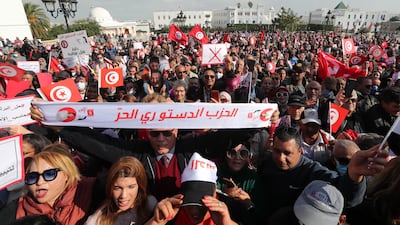Tunisia’s government dissolved its Ministry of Local Affairs on Wednesday, bringing the municipality councils under the control of the Ministry of the Interior in a move some have criticised as an attack on the country’s democracy.
The new decree also places financial responsibility for the Fund for Loans and Support of Local Communities as well as the Training and Support Centre for Decentralisation under the supervision of the ministry, whose primary purpose is governing state security and police forces.
The municipal elections held in 2018 were seen as a sign of real progress in Tunisia’s democratic transition. The councils were a step towards dismantling the highly centralised state power developed during the years of rule by Habib Bourguiba and Zine El Abidine Ben Ali.
The Ministry for Local Affairs had been the bridge between national and local governments but was absent from the list of ministries announced as part of Kais Saied and his prime minister Najla Bouden’s new government.
Mr Saied evoked emergency powers on July 25, firing the previous prime minister and suspending Parliament, claiming he was acting to remove an ineffectual government amid an economic and health crisis.
On September 22, he suspended parts of the constitution and installed rule by decree, maintaining full control of the judiciary as well as powers to sack ministers and issue laws.
“Because neither Mr Saied nor Najla Bouden have offered any explanation of this action, nobody knows why they have done this, but one interpretation is that it is a symbolic statement because the municipal councils are made up of elected people from political parties,” Chaima Bouhlel, an expert in North African democratic transition and decentralisation and a non-resident fellow at The Tahrir Institute for Middle East Policy, told The National.
“Some would argue that he is doing this so he has more oversight of municipalities and that he is more comfortable negotiating with the security services and armed forces,” she added.
Ms Bouhlel said that in practical terms, the municipalities can continue to function normally and the real problem is the delay in some decisions.
But with the municipalities coming under the aegis of the Ministry of the Interior, “there is a conflict of political interest because now the Ministry of the Interior is bidding for budgets for both security and for local governments and because security is seen as a high priority, funding for local government may suffer.
“This is not an advancement of decentralisation of power nor of democracy in Tunisia.”

